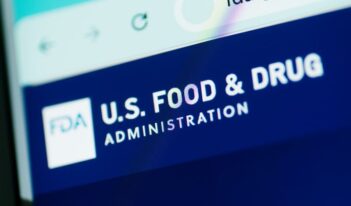
A unanimous Supreme Court instructed the Fifth Circuit to reconsider the harmless error rule for agency action.
In FDA v. Wages & White Lion Investments, the U.S. Supreme Court unanimously vacated and remanded a U.S. Court of Appeals for the Fifth Circuit decision reviewing the denial by the U.S. Food and Drug Administration (FDA) of marketing approval for flavored e-cigarette products. This case involved the harmless error rule, which prevents courts from setting aside decisions because of harmless errors. The Court discussed uncertainty about how the harmless error rule applies to decisions made by agencies rather than courts. It then instructed the Fifth Circuit to reconsider the harmless error rule with little additional guidance.
The Family Smoking Prevention and Tobacco Control Act (TCA) requires companies to obtain approval from FDA to market new tobacco products in the United States. FDA cannot authorize marketing of a new tobacco product unless it concludes it would be “appropriate for the protection of public health” based on considerations such as whether more people will begin using tobacco products.
Companies began selling e-cigarettes in 2007, and these products gained popularity quickly. Although e-cigarettes were promoted as being safer than traditional cigarettes, concerns arose that many people who did not previously use tobacco products would begin using e-cigarettes. Flavored e-cigarettes in particular drew concerns as they gained popularity among younger Americans.
In 2016, FDA issued a rule that determined that e-cigarettes are “tobacco products,” which made most e-cigarette products retroactively subject to the TCA’s requirements. FDA delayed enforcement of those requirements for several years to give manufacturers time to file applications for marketing authorization.
Before it began adjudicating marketing applications for e-cigarette products, FDA provided guidance to manufacturers and agency personnel about how the applications would be reviewed. The guidance included information about the required scientific evidence concerning the product’s impact on public health, comparisons to other tobacco products, and FDA’s enforcement priorities based on device type. It also suggested that manufacturers submit information about their marketing plans, such as plans to verify the age of purchasers.
More than 500 companies filed applications for more than 6.5 million e-cigarette products. Faced with a court-imposed deadline to adjudicate the applications, FDA reviewed and denied applications for 55,000 flavored e-cigarette products in 2021. FDA explained that these manufacturers did not provide adequate scientific evidence to overcome the health risks that the products posed to youth.
Afterwards, FDA denied applications filed by Wages and White Lion Investments to market flavored e-cigarettes with a variety of fruit and dessert flavors. As with the other applications, FDA concluded that White Lion did not provide sufficient scientific evidence to support marketing approval. The agency also explained that it decided not to review marketing plans, given that no marketing plan it had reviewed overcame the documented risks of flavored e-cigarette products.
The Fifth Circuit held that FDA’s denial was arbitrary and capricious because FDA changed its position about four criteria articulated in its guidance without an adequate explanation. The court then rejected FDA’s argument that any errors were harmless.
The Supreme Court disagreed with the Fifth Circuit’s reasoning. In a unanimous opinion authored by Justice Samuel Alito, Jr., the Court explained that under its change-in-position doctrine, an agency action is arbitrary and capricious if an agency changes course and does not offer an adequate explanation for the change.
With respect to three of the issues raised by White Lion—involving FDA’s treatment of scientific evidence, comparative efficacy, and device type—the Court concluded that FDA did not change the position reflected in its guidance.
For the final issue—involving FDA’s treatment of marketing plans—FDA did not contest that it changed position. Instead, FDA argued that its failure to consider the marketing plans was a harmless error because the marketing plans would not have changed its decision, based on its consideration of similar marketing plans in other applications. It asked the Supreme Court to clarify the harmless error standard for agency actions.
The Court acknowledged that there is some tension between the Administrative Procedure Act (APA) and its own precedent regarding the harmless error rule for agency decisions.
In its 1943 decision in SEC v. Chenery Corp., the Supreme Court held that courts can only affirm agency actions based upon the grounds articulated by the agency when it took the action. Under the Chenery doctrine, courts have concluded that they should ordinarily vacate and remand agency decisions when they identify agency errors.
The APA, however, instructs courts to take “due account … of the rule of prejudicial error” when reviewing agency actions. The prejudicial error rule—also known as the harmless error rule—in the Federal Rules of Civil Procedure at the time that the APA was enacted only required courts to vacate a decision if the failure to do so would be “inconsistent with substantial justice”—a rule that requires vacatur and remand less often than the Chenery rule.
The Court did not attempt to provide a “complete answer” to the “vexing problem” posed by the competing guidance from its precedent and the APA. For now, the Court simply agreed with FDA that the Fifth Circuit applied its precedent about the remand rule too broadly. The Court noted that remand may be unnecessary, for example, when the error had no bearing on the procedure or substance of the agency decision. At the same time, it explained that merely showing that the agency would have reached the same result would not necessarily make a remand inappropriate. The opinion therefore provides some guidance for courts to assess when agency errors may be excused as harmless, but the contours of the harmless error rule remain unclear.
White Lion also leaves other significant administrative law questions unanswered. It remains unclear, for example, whether the change-in-position doctrine applies to agency positions articulated in nonbinding guidance. In a footnote, Justice Alito noted that the Court assumed without deciding that the change-in-position doctrine applied here because the parties did not contest the issue. Justice Alito observed, however, that prior Supreme Court cases involving the change-in-position doctrine have involved policies expressed through more formal procedures, such as notice-and-comment rulemakings.
In addition, the Court acknowledged that it did not address the merits of a host of other potential administrative law challenges, such as whether the TCA requires FDA to articulate the requirements for e-cigarette marketing applications through notice-and-comment rulemaking rather than through adjudication. In a footnote, the majority also stated that its opinion expressed no view on other challenges raised by amici, including under the nondelegation doctrine, which prevents Congress from delegating its legislative authority, and the major questions doctrine, which prevents agencies from regulating on matters of “vast economic or political significance” without clear congressional authorization.
In short, although the Court’s unanimous decision provided some clarity on the harmless error rule for agency decisions, it left several important administrative law issues unresolved.
This essay is part of a series, titled “The Supreme Court’s 2024-2025 Regulatory Term.”




